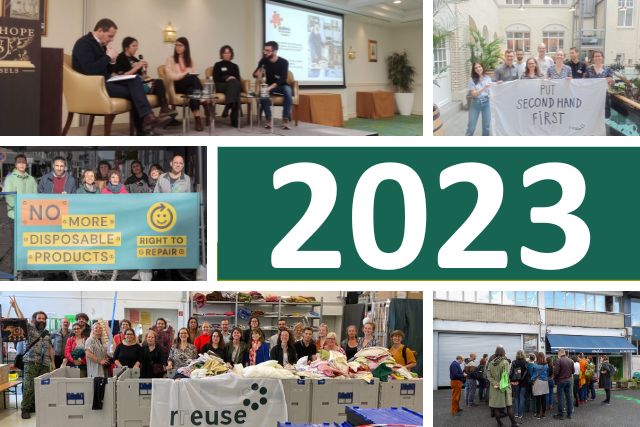Looking back to a bustling and successful year 2023
In 2023, RREUSE worked tirelessly to raise awareness about the inspiring work of our social enterprise members and promote their impact on social inclusion and circular economy. We closely monitored the environmental, circular, and socio-economic policies of the European Union, to create connections between the EU’s social and environmental agenda and promote the role of social enterprises. We are delighted to report significant accomplishments on several policy files, including broader efforts to raise awareness, promote circularity, and support the skill development work of social enterprises.
2023 in numbers
RREUSE team members spoke at 35 events and (co-)organised 8 public events that gathered 755 participants.
We also organised 22 Members Exclusive Sessions, including 4 Innovation Forum Sessions where social enterprises shared and discussed 11 best practices of social and circular innovation. The topics of 2023 included the re-use of solar panels, partnerships with private enterprises, quality certification for second-hand, digital exclusion, solidarity across borders, social and green public procurement or measuring CO2 savings of re-use.
We produced 50 publications and marked a 25% increase in our social media followers. Our website received nearly 30,000 visits, which resulted in over 86,000 page views.
EU-funded projects
A major milestone for RREUSE is our first time leading EU-funded projects. We kicked off two such efforts in 2023: The Digital Era of Social Enterprises (DigiSocCirc) and Buying Social and Circular (BuySocCirc).
Key advocacy initiatives and their outcomes
Skills Development in the Circular Economy
RREUSE has published a study titled “Putting people and skills at the core of the circular economy: 18 stories from social enterprises.” This publication is significant because it addresses the data gaps on social enterprises’ efforts to promote skills that will be required in a circular economy. It also helps in understanding how these organisations play a pivotal role in facilitating a fair transition that leaves no one behind. The publication has been widely promoted through public events and will remain an important reference point. We have also published a policy position paper that suggests measures to support the skill development work of social enterprises and unlock the potential of the 2023 European Year of Skills.
Public Procurement
Our recently updated position paper on the 2014 EU Public Procurement Directive has been quoted in a study titled “The Social Impact of Public Procurement.” This study was commissioned by the European Parliament’s EMPL Committee and presented at one of its hearings. Our position paper contains key recommendations for both EU and national institutions. We also kicked off research on green and social public procurement in practice, funded by the European Climate Foundation that will be published in 2024.
The Council Recommendation on Developing Social Economy Framework Conditions
In EU social and economic policy, we can see the impact of our sustained advocacy efforts in the Council Recommendation on Developing Social Economy Framework Conditions, which was approved by the EU in November 2023. The Recommendation unequivocally calls for Member States to integrate social economy actors into circular legislation (5 references to “re-use”, 6 to “repair”, and 13 to “circular economy”) and to support their re-use and repair activities. Equally, the Recommendation calls for improving access to public procurement, state aid, and funds. This is aligned with several points that RREUSE has strongly advocated on. Finally, the Recommendation comes with the annexed Taxation Guidelines for supportive taxation rules, including via VAT. This is something that RREUSE called for in our late 2022 position paper.
We also celebrated a series of successes in environmental policies, from the right to repair to critical raw materials, WEEE and textiles. To name but a few:
Critical Raw Materials Act
Unlike the original proposal, the Critical Raw Materials Act now includes a clear commitment by Member States to “promote waste prevention, increase re-use and repair of products and components, and recover relevant critical raw materials”.
Ecodesign for Sustainable Products Regulation
The Ecodesign for Sustainable Products Regulation includes an explicit ban on the destruction of unsold textiles. This was absent from the original proposal and was our key advocacy point.
Waste from Electrical and Electronic Equipment
In the area of Waste from Electrical and Electronic Equipment the final text of the 2023 targeted revision of the WEEE Directive now includes wording that ensures increasing alignment with the waste hierarchy will be a key objective of the next revision. Additionally, a recently published recommendation encourages Member States to set re-use targets and enhance the role of social enterprises in the collection.
Waste Framework Directive
Lastly, the ongoing targeted revision of the Waste Framework Directive demonstrated the impact of persistent advocacy over the years, with the proposal by the European Commission including a significant recognition of social enterprises’ role in re-using textiles. It features the term “social economy” 8 times and “social enterprises” 11 times — compared to just 2 mentions of “social economy” in the previous revision of 2018. Furthermore, RREUSE is explicitly mentioned 27 times in the impact assessment that accompanied the latest proposal. As the revision is unfolding, we continue to take every opportunity to highlight the importance of social enterprises in driving meaningful positive change for a more sustainable textile value chain.


